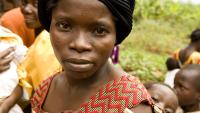Evolution

The Evolution of the RAISE Initiative
The Reproductive Health Access, Information and Services in Emergencies (RAISE) Initiative was designed to catalyze change in the ways in which sexual and reproductive health is addressed in field services, humanitarian organizations and global decision-making. A joint initiative 2006-2011 of the Columbia University Mailman School of Public Health and Marie Stopes International (MSI), its aim was to ensure that good quality sexual and reproductive health services are routinely provided to those in emergency situations. Focusing on settings with particularly high IDP populations, RAISE supported projects in Chad, Colombia, Democratic Republic of Congo, Sudan and Northern Uganda. RAISE brought together major NGOs and UN agencies from the fields of relief and development, building on their long-term experience. Partners included the American Refugee Committee, CARE, the International Rescue Committee, JSI Research and Training Institute, Marie Stopes International partners, Profamilia Colombia, Save the Children, UNFPA and the Women's Commission for Refugee Women and Children.
The programme integrated financial and technical assistance, advocacy, clinical training, and research. The aim was to strengthen institutional commitment to comprehensive reproductive health service delivery and expand good quality services in crisis settings, and strengthen the policy and funding environment for the provision of these services in refugee and IDP situations, focusing on the following areas:
-
basic and comprehensive emergency obstetric care, including post-abortion care,
-
all family planning methods and emergency contraception,
-
sexually transmitted infection prevention and treatment,
-
HIV prevention, voluntary counselling and testing, prevention of mother-to-child transmission and referral, and
-
medical response and referral for gender-based violence.
Initially a 5-year program, the length of programming enabled partner agencies to develop expertise and to provide comprehensive services, rather than the more limited range that can reasonably fit into the familiar 6–12 month projects, to set longer-term objectives and monitor results, and to strengthen linkages between relief and development partners.
To ensure high quality service delivery by its partner agencies, RAISE provided clinical training and follow-up, both in the field, at MSI's comprehensive reproductive health center in Nairobi and at the Centre for Research and Training for Quality of Reproductive Health Care at Souro Sanou University Hospital, Bobo Dioulasso. Training of trainers and competency-based trainings gave health teams from NGOs and ministries of health the opportunity to update and develop their clinical skills in high quality comprehensive reproductive health care settings. Participants returned to their health facilities, whether in refugee camps or in the community, not only equipped with the skills needed to provide quality services, but with support and supervision to ensure their improved skills are utilized and maintained.
RAISE's objectives were supported and magnified through the sharing of knowledge among partner organizations and beyond. A wide range of knowledge-sharing mechanisms was used to reach practitioners, managers and decision-makers at all levels. In June 2008, RAISE, together with the Reproductive Health Response in Conflict Consortium, hosted the Reproductive Health in Emergencies Conference through which renewed attention to reproductive health in emergencies was directed. The conference provided an opportunity to showcase best practices, present technical updates, share programme experience and evaluation, and appraise the current policy environment. RAISE's global advocacy efforts were a critical corollary to the service delivery activities, focusing as they do on the policy and funding changes needed to secure reproductive health services for displaced communities through relief and development assistance.
In 2011, RAISE shifted to more intensively focus on contraceptive services and abortion-related services, as these two components receive less attention relative to other components of SRH. RAISE also increased its support to partners to ensure good quality of care. This included support to analyze and use data to improve program activities; conduct systematic supportive supervision; and understand how providers' attitudes towards SRH and clients influence the scope and quality of services they provide and subsequently how to change attitudes that do not favor good quality care.